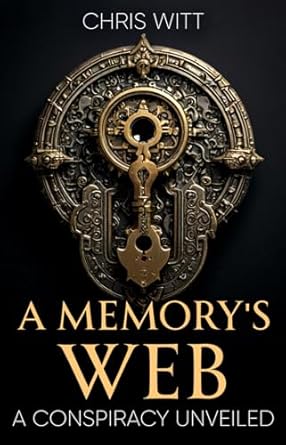Stories are fundamentally about the people who endure them; they encapsulate the trials, triumphs, and transformations of individuals navigating the complexities of life. Each character’s journey reveals their resilience, vulnerability, and growth as they confront challenges, forge relationships, and make choices that shape their destinies.
Similarly, a protagonist with a traumatic past might oscillate between moments of vulnerability and resilience, making him relatable yet unpredictable. This depth adds intrigue to his journeys and mirrors real-life complexities, illustrating how personal histories can influence choices and relationships, ultimately driving character development and enriching the narrative.
In A Memory’s Web by Chris Witt, Jacob Hunter emerges as an enigma, a protagonist whose life is not just an archetype. He’s a man plagued by loss, betrayal, and uncertainty of his morality. The challenges are far from over for him as he fights his fractured identity—an existential puzzle where survival, redemption, and trust collide. But what exactly makes this character so captivating to readers?
The Duality of Identity: Hunter or Campbell?
Jacob’s identity crisis adds a psychological depth that draws readers into his world. Early in the story, he grapples with a question that puzzles him. Who is he? And what is his story? Whether he is Jacob Hunter, a gang member running from his past, or Adam Campbell, a mysterious alias with a hidden life. This duality creates tension as Jacob questions his motives—was he a victim of circumstances or an active participant in the criminal underworld? The ambiguity forces readers to play detective alongside him, constantly evaluating clues to discern truth from deception.
A Moral Compass Pointing Nowhere
What makes Jacob Hunter even more fascinating is his evolving relationship with morality. As fragments of his past surface, we learn that Jacob isn’t a typical hero. He possesses medical knowledge and combat skills, but these abilities only hint at a dangerous history.
His discovery of three tattooed dots—symbolizing past killings—forces him to confront the possibility that he was not only involved in crime but may have been killed in cold blood. Yet, despite these dark revelations, Jacob’s actions suggest a man striving to find redemption, making readers root for a flawed but redeemable anti-hero.
Survival in a Web of Lies and Violence
The story thrusts Jacob into situations that demand quick thinking and brutal decisions. From brawling with crooked cops to deciphering hidden codes, Jacob’s instincts keep him alive—but only just. His paranoia is palpable, heightening the suspense as he navigates shifting alliances and threats from law enforcement and his former gang, Drogue. The lurking danger pushes Jacob to reconcile with his violent tendencies, adding multiple layers to his personality that make him unpredictable and engaging.
The Loss of Memory
The loss of memory is a well-worn trope in thrillers, but in A Memory’s Web, it shapes the entire emotional arc. Jacob’s amnesia offers both freedom and frustration: freedom from the weight of his past but frustration as he tries to reclaim agency over his life. The uncertainty about whether he betrayed his gang or was betrayed by them mirrors his internal struggle to understand who he truly is. This tension between past and present gives the character emotional resonance, making readers invest in his journey toward self-discovery.
Redemption and Self-Forgiveness
What ultimately makes Jacob so compelling is the possibility of redemption. Beneath his violent exterior lies a man seeking to rebuild his fractured self. Jacob’s journey is one of atonement, whether it’s his instinct to spare lives, his discomfort with his past actions, or his search for personal truth. The question isn’t just whether Jacob can outrun his pursuers—it’s whether he can forgive himself.
Jacob Hunter’s character is a masterclass in complexity. He is neither purely good nor inherently evil; instead, he occupies a morally gray area that resonates with readers. His struggle with identity, morality, and redemption invites introspection: How would we act if we didn’t know who we were? Could we accept our darker truths? A Memory’s Web leaves these questions lingering, making Jacob Hunter’s journey unforgettable.
With his compelling mix of action, introspection, and moral ambiguity, Jacob Hunter is not just another protagonist; he’s a character who forces readers to question what it means to know oneself and whether the past can ever indeed be left behind.


